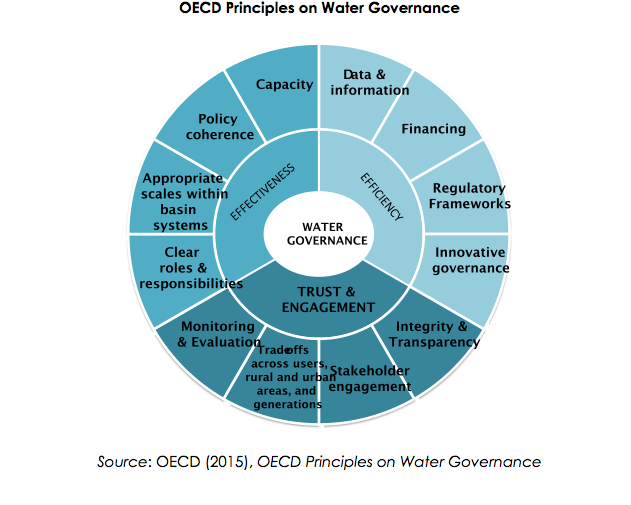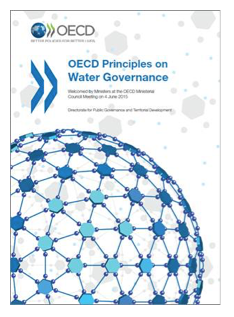Future projections related to water are sobering: by the middle of this century, the world's population will rise to 9 billion, 4 billion of which will live in severely water-stressed basins, while demand for water is expected to rise by 55% globally.
Future projections related to water[1] are sobering: by the middle of this century, the world’s population will rise to 9 billion, 4 billion of which will live in severely water-stressed basins, while demand for water is expected to rise by 55% globally. The challenges to confront are huge, but they can be turned into opportunities for economic, social and individual betterment.
A Matter of Governance
The Organisation for Economic Co-operation and Development (OECD) argues that a number of water crises around the globe are primarily governance crises. In many circumstances, the problem goes beyond hydrology, infrastructure and financing; it is about who does what, at which scale, how and why. In a word, it is the right governance approach that holds the key to make water a harbinger of progress.
The OECD defines water governance as “the range of political, institutional and administrative rules, practices and (formal and informal) processes through which and how decisions are taken and implemented; stakeholders articulate their interests and have their concerns considered; and decision-makers are held accountable in the development and management of water resources and the delivery of water services”.
There is a strong case why multi-level governance matters in the water sector. In most cases, water management is largely decentralized; it is highly monopolistic and subject to market failures; it involves multiple authorities across levels of government, as well as stakeholders from the private and non-profit sectors; it is capital-intensive; and it has externalities and spillovers on many policy domains, in particular health, energy, agriculture, spatial planning, land use and the environment. This means that a crucial challenge for policymakers and practitioners is to foster effective coordination across people, places and policies, especially given that water logistics cut across administrative perimeters. This makes coordination across people, policies and places essential for effective, inclusive and efficient design and implementation of water policies at different scales.
However, there is no one-size-fits-all solution to water challenges worldwide, but rather a large diversity of situations within and across countries. Governance responses should therefore be adapted to territorial specificities. It should be recognized that governance is highly context-dependent and that it is important to fit water policies to places.
OECD Principles on Water Governance
Coping with current and future challenges requires robust public policies, targeting measurable objectives in pre-determined time-schedules at the appropriate scale, relying on a clear assignment of duties across responsible authorities and subject to regular monitoring and evaluation.
To address this need for robust public policy, over the past 6 years, the OECD has been building the evidence base to send a wake-up call for governments to pay as much attention to the “how to manage water and with whom” as to the “what to do.” This analysis relied on benchmarks, national policy dialogues and thematic work. It culminated with the recent adoption by the Organisation’s 34 Members of OECD Principles on Water Governance.

The Principles build on three synergetic pillars of water governance: efficiency, effectiveness, and trust and engagement. These pillars contribute to the design, delivery and implementation of better water governance policies for better lives. They lay down the 12 “must-have” components for governments to navigate the tenets of good public policy on water, and distil what they need for their own challenges:
1. Clearly allocate and distinguish roles and responsibilities for water policymaking, policy implementation, operational management and regulation, and foster co-ordination across these responsible authorities.
2. Manage water at the appropriate scale(s) within integrated basin governance systems to reflect local conditions, and foster co-ordination between the different scales.
3. Encourage policy coherence through effective cross-sectoral co-ordination, especially between policies for water and the environment, health, energy, agriculture, industry, spatial planning and land use.
4. Adapt the level of capacity of responsible authorities to the complexity of water challenges to be met, and to the set of competencies required to carry out their duties.
5. Produce, update, and share timely, consistent, comparable and policy-relevant water and water-related data and information, and use it to guide, assess and improve water policy.
6. Ensure that governance arrangements help mobilize water finance and allocate financial resources in an efficient, transparent and timely manner.
7. Ensure that sound water management regulatory frameworks are effectively implemented and enforced in pursuit of the public interest.
8. Promote the adoption and implementation of innovative water governance practices across responsible authorities, levels of government and relevant stakeholders.
9. Mainstream integrity and transparency practices across water policies, water institutions and water governance frameworks for greater accountability and trust in decision-making.
10. Promote stakeholder engagement for informed and outcome-oriented contributions to water policy design and implementation.
11. Encourage water governance frameworks that help manage trade-offs across water users, rural and urban areas and generations.
12. Promote regular monitoring and evaluation of water policy and governance where appropriate, share the results with the public and make adjustments when needed.
The Principles were developed using a multi-stakeholder and bottom up approach within the OECD Water Governance Initiative (WGI). They were endorsed by 65 public, private and non-profit organizations involved in the OECD WGI at the 7th World Water Forum in April in the Republic of Korea, through the Daegu Declaration under the auspices of the OECD Secretary General Angel Gurría.
Looking ahead, the OECD will support interested countries in implementing the Principles, which will include identifying and scaling up best practices. The OECD is also developing water governance indicators to determine whether the framework conditions and governance mechanisms are in place for water institutions to deliver, and to support bench-learning and international comparisons within and across countries.

Contact
Aziza Akhmouch,
Head of the OECD Water Governance Programme
(+ 33) 1 45 24 79 30